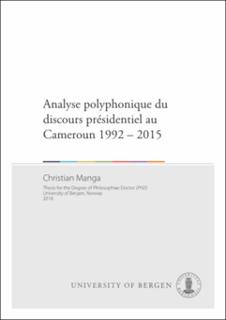| dc.contributor.author | Manga, Christian | |
| dc.date.accessioned | 2018-11-02T14:33:35Z | |
| dc.date.available | 2018-11-02T14:33:35Z | |
| dc.date.issued | 2018-09-14 | |
| dc.identifier.isbn | 978-82-308-3667-5 | |
| dc.identifier.uri | https://hdl.handle.net/1956/18695 | |
| dc.description.abstract | Ce travail est parti de deux observations. La première sur le discours politique en général, et la seconde sur les communications du président de la République du Cameroun, Paul Biya. Tenu dans le cadre d’une action politique, qui est elle-même régie par des principes d’influence et de « violence symbolique », l’énoncé politique constitue inévitablement le lieu de rapports de force entre les visions du pouvoir et celles du contrepouvoir. La parole des hommes politiques, à cet effet, est généralement moulée dans une dialectique rhétorique acerbe et critique des uns vis-à-vis des autres. La question de recherche qui sous-tend ce travail porte cependant sur la polyphonie du discours du chef de l’État camerounais, l’attitude consensuelle de celui-ci dans un contexte porté vers la discussion et la contradiction. Nous avons montré que la polyphonie de ses communications baisse considérablement. La lecture que nous avons faite est que cette tendance vers l’irénisme porte en arrière-plan les moeurs politiques du pays, où l’opposition et les organisations de la société civile sont passives. En tout état de cause, sous la surface discursive de Paul Biya se cache la profondeur de la scène politique dans ce qu’elle a de particulier : pléthore de formations idéologiques, mais absence de forces alternatives crédibles. Par-delà l’analyse du contexte sociopolitique, cette thèse revisite les modèles théoriques polyphoniques dont elle s’inspire et qu’elle exploite. | en_US |
| dc.description.abstract | This work is based on two observations. The first one on the political speech in general, and the second on the political communications of the President of the Republic of Cameroon, Paul Biya. Held within the framework of a political action, which is itself governed by principles of influence and "symbolic violence", the political statement inevitably constitutes the scene of power relations between the visions of power and those of against power. The word of politicians, for this purpose, is generally molded in a rhetorical dialectic acerbic and critical of each other vis-a-vis others. The research question that underlies this work brings to this effect the polyphony of the speech of the Head of State; the consensual attitude of the latter in a context focused on discussion and contradiction. We have shown that the polyphony of its communications drops considerably. The reading that is made of it is that this tendency toward consensus carries in the background the political mores of the country, where the opposition and the organizations of the civil society are passive. In any case, beneath Paul Biya's discursive surface hides the depth of the political scene in what it has of particular: a plethora of ideological formations, but absence of credible alternative forces. Beyond the analysis of the socio-political context, this thesis revisits the polyphonic theoretical models from which it draws and exploits. | en_US |
| dc.language.iso | fra | eng |
| dc.publisher | The University of Bergen | eng |
| dc.rights | Attribution 4.0 International (CC BY 4.0) | eng |
| dc.rights.uri | https://creativecommons.org/licenses/by/4.0/ | eng |
| dc.title | Analyse polyphonique du discours présidentiel au Cameroun 1992 – 2015 | eng |
| dc.type | Doctoral thesis | |
| dc.rights.holder | Copyright the author. | eng |
| dc.subject.nsi | VDP::Humaniora: 000::Språkvitenskapelige fag: 010::Fransk språk: 024 | |

